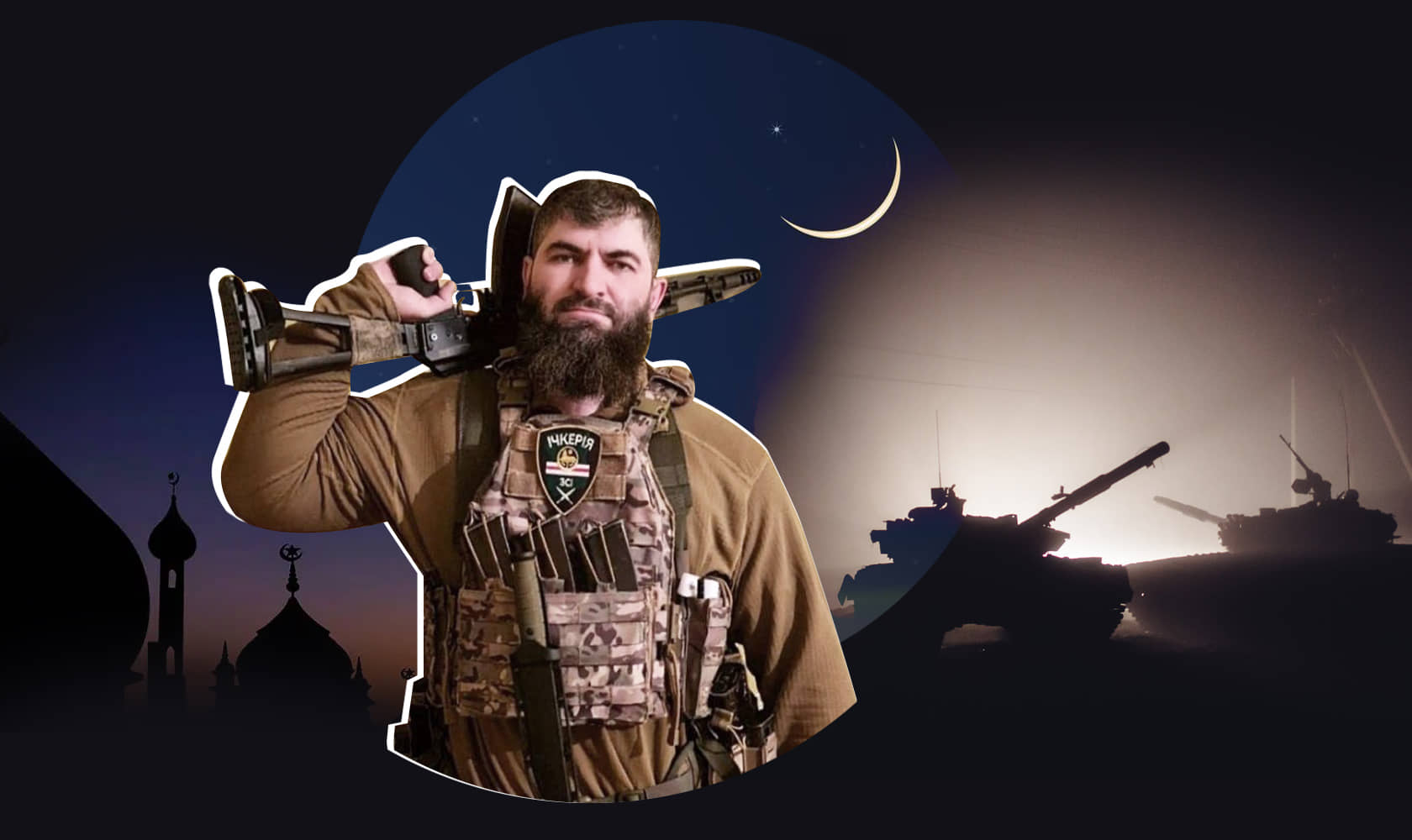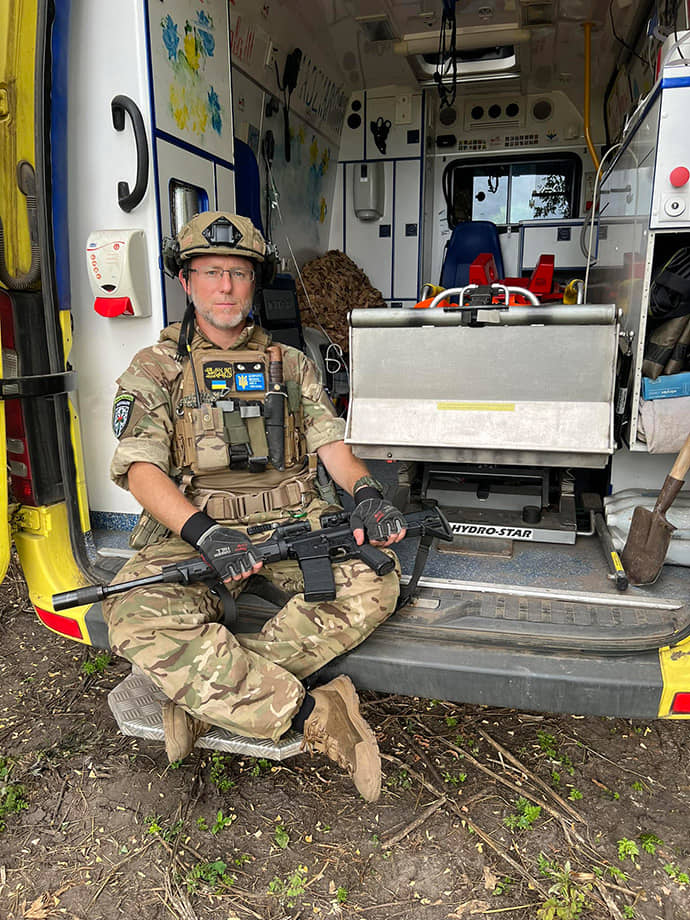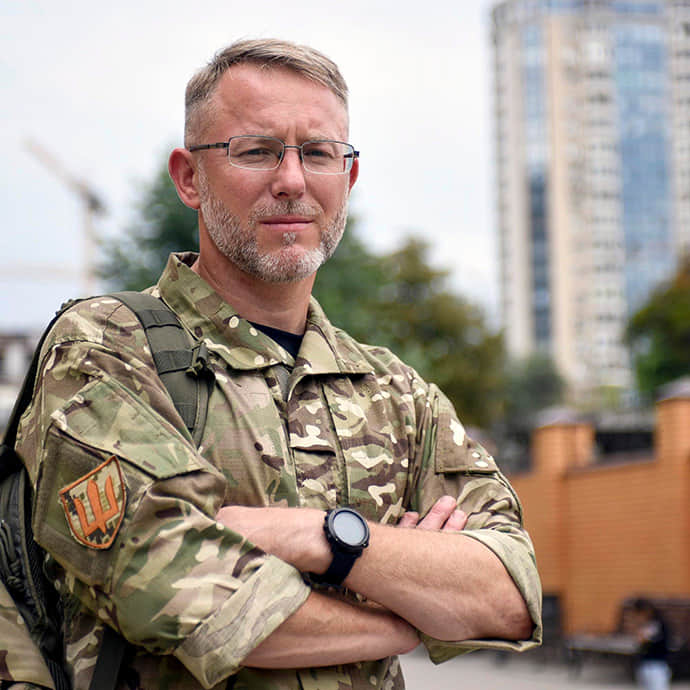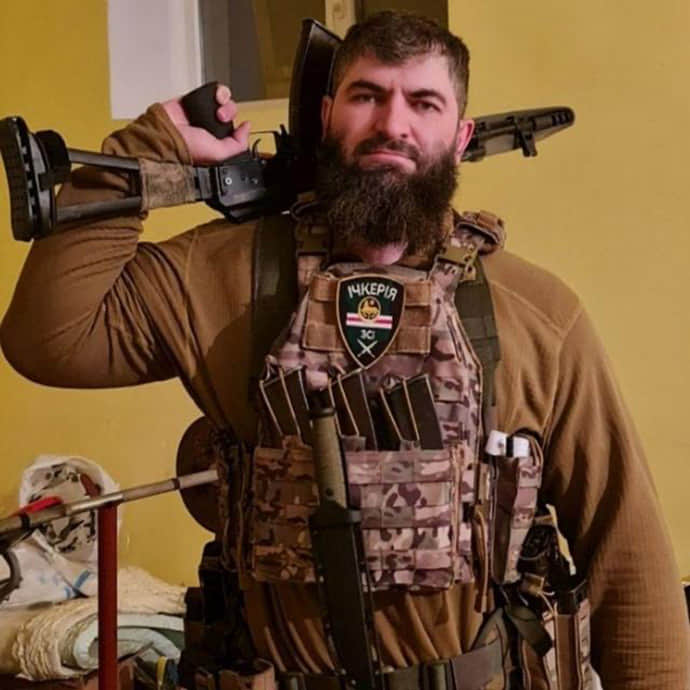Ramadan on the front line: the Ukrainian Muslims fighting without a sip of water or a crumb of bread

Among the military personnel defending Ukraine, there are some who woke up before this original article was published (at 05:30) to eat, drink and pray. They won’t touch a crumb of bread or take a sip of water until the sun sets. And it’s not just food – even smoking is off-limits.
This isn’t because they are reconnaissance soldiers preparing for a dangerous raid into enemy-occupied territory (although some of them may well be too). These soldiers are Muslims observing the fast which began on the morning of 11 March at the start of the holy month of Ramadan.
Fasting during Ramadan is one of the five pillars of Islam, alongside praying five times a day, annual almsgiving, pilgrimage to Mecca, and the belief that there is no god but the Almighty and Muhammad is His messenger. It was during Ramadan that Muslims were given the Quran.
The Islamic calendar is based on the phases of the moon, so Ramadan shifts by several days each year. In 2024, Muslims will be fasting until 9 April.
Abstaining from food, water, cigarettes and swearing from dawn to dusk is challenging enough in civilian life. Ukrainska Pravda decided to find out what observing the fast is like for soldiers in the combat zones, where a day without water could leave them weakened before battle, while praying in the open air could lead to injury or death.
First time in 30 years
Air defence forces fighter Said Ismagilov seems sad.
If you follow him on Facebook, Said can be cheerful, menacing, tired, inspired, focused – never sad. But there was a hint of sadness in his voice as he spoke with Ukrainska Pravda.
Said has observed the Muslim fast for thirty years in a row. He started keeping the fast when he was a 15-year-old student at Donetsk Polytechnic University. But this year is the first time in three decades that there are no other Muslims with him during Ramadan.
Before the full-scale war began, he had plenty of fellow believers around him. As the Mufti of the Ummah, the Spiritual Administration of Ukraine's Muslims, Said Ismagilov worked as an imam in a mosque for 20 years.
"Ramadan was the busiest time for an imam," he recalls. "The mosque was overflowing. You’d arrive, and a thousand other people would have gathered for the Taraweeh."
During Ramadan, besides the obligatory five daily prayers, Muslims say an additional nightly prayer called Taraweeh – ideally collectively.

In 2022, Said was working as a paramedic during Ramadan, and his Taraweeh prayer community consisted of two other Muslim paramedics who worked alongside him. During the battles in Donetsk in 2023, his prayer circle expanded to include fighters from the Sheikh Mansur Volunteer Battalion.
"The sense of community when there were many of us, and we all prayed together by night and defended our homeland by day, was a new experience," Said shares. "As an imam, I used to lead the Taraweeh prayer, and between five and fifteen Muslims would come each time."
Sometimes the fighters had just come back from battle and were still dirty. They performed their ablutions and joined the prayers.
There, under the skies of Chasiv Yar in Donetsk Oblast, Said gained a deeper understanding of the stories from books about other times and other skies – about the years of the Prophet Muhammad's life and his most famous military campaigns during Ramadan. Now, Said better understood the feelings of those who had fought by day and prayed by night.
This year, Said’s Taraweeh prayers are individual rather than collective. He reads one-thirtieth of the Quran every night, finishing the holy book on the last day of Ramadan. No one joins him, but the fighters nearby listen.
"My comrades approve. They enjoy listening to the recitation of the Quran," Said says. "They say it is very calming.
"Just leave me a portion for the evening"
Soldiers have one schedule, Muslims have another. During Ramadan, Said needs to combine them both.
He wakes before dawn each morning. He needs to eat before "the black thread becomes distinct from the white" (a reference to the blackness of the night and the whiteness of the day). The meal you eat right before sunrise is called suhoor. But Said admits that he doesn't have much of an appetite at such early hours. He tries to brush his teeth at least and to drink enough water. After the morning prayer, he is ready for his military duties.
"We have a clear schedule specifying what each serviceman is doing and when. It’s very serious, because we have to be ready to engage in anti-aircraft combat at any moment," he emphasises.
During wartime, soldiers are allowed to combine the noon and afternoon prayers and the evening and night prayers. In field conditions, the prayer may consist of two rather than four Rak'a (the iteration of prescribed movements and supplications performed by Muslims as part of their obligatory prayer), and the time frame for performing the daily prayer is fairly generous.
Muslims often hang a printed prayer schedule in a convenient and visible place. Said just needs to glance at it to check. On the day we talked to him (which was before the clocks were put forward to daylight saving time), he could have recited the night prayer at any time between 19:38 and 04:33. He is sure that that's enough time for any serviceman to find five or ten minutes for prayer.
"Sometimes someone may be in an environment and a state in which they cannot perform the prayer. For example, they may be under fire from artillery, multiple-launch rocket systems or mortars. Sometimes that can go on for several days in a row. And that person is hiding in a trench or dugout, lying or sitting there for a long time. Afterwards, when they get out of that difficult situation, they have to make up for all the missed prayers," Said explains.
Similarly, the rules on eating and drinking are somewhat relaxed for soldiers. Hours of hunger and thirst can weaken a person and if they are in combat, it could cause them to be defeated. So a fairly practical principle applies here: a fighter can skip fasting for a day if he would risk losing his alertness, endangering others, or being unable to conduct a combat mission. But later, when conditions are favourable again, the soldier would still have to make up for the missed days of fasting.
As the sun sets (after 19:00 in Ukraine now), the time of breaking the fast begins. Muslims call this iftar. Said drinks some water and eats a date or an energy bar. If there’s an opportunity to have dinner, he sits down to eat; if not, he can wait.
When he worked as an imam, he used to see people rushing to iftar as if they would die if they didn't eat something in the first few minutes. He couldn't understand them. In a combat zone, sometimes you can even forget about food.
On one occasion in March 2023, Said's evacuation team had been struggling for a long time to get an injured person out from under fire, and the sun had set by the time they left the positions for the hospital. They had no food with them, only a few sips of water. It wasn’t until late at night that Said remembered that due to the stress he’d been under, he had forgotten to break his fast.

Another challenge that Muslim soldiers face regarding food supplies is that halal rations are not provided. The soldiers must take care of their special diet, bringing their own food with them. And during Ramadan, another problem arises.
"It would be good if Muslims could be met halfway when they need to eat or drink before dawn or after sunset," Said points out. "If this need could be taken into account by both their brothers-in-arms and their command, and food set aside for the time when Muslims can eat.
This is a very simple need. It’s not asking for a mosque to be organised. It's simple: leave me a portion to eat, for example, at 18:00."
"You show the devil that you possess willpower"
The first week of fasting was tough, says Alim, an officer in the Marines. Sometimes he felt weak on those days, sometimes he had headaches, but he continued to fast. The background sounds of gunfire seem endless at the contact line, but at the beginning of Ramadan, the last hour before iftar was endless for him.
Fasting is also an easy way to quit smoking. Alim usually smokes half a pack a day, but now he has had to drastically cut his intake to one or two cigarettes per evening. But what he misses the most is a cup of fragrant coffee. Coffee is an essential part of life for Crimean Tatars, and Alim holds his breath or tries to avoid his brothers-in-arms when they put the cezve (a traditional Turkish coffee pot) on the fire during the day.
We talk to Alim after iftar. He’s already eaten his shurpa – a hearty soup (and this is "men's" shurpa, the soldier emphasises; it’s fattier, and some of the ingredients are not chopped, but thrown into the pot whole) – and now, over a cup of tea, he can talk about God and the devil.
"It's a month of purification," he says. "You devote time to yourself, read more. You hope that the Almighty will accept your fast and forgive your sins. And you show the devil that you control your feelings, that you possess willpower.
After what we've been through, there are times when you can't control your emotions. But when you fast, you approach everything more calmly. You used to be nervous in some situations and sometimes snapped, but now you can ignore such things."
Another Ramadan restriction is on swearing and hatred. How do you avoid this if the Russians are killing people around you, and the word "f**kers" is thrown around so often that everyone knows who it means?
If you were unable to control yourself and let out a swear word, you can ask Allah for forgiveness and say a prayer of repentance. For Alim, consciously refusing to swear is a way of achieving balance.
Hate is even easier. Alim says he has no more anger than an office worker replacing a cartridge in the printer. Just as a manager presses a button and sends letters to print, so Alim determines the coordinates of the Russian forces and adjusts the artillery fire.
After the restrictions of fasting comes the festival of Eid al-Fitr (known as Oraza Bayram in Ukraine), one of the two main religious festivals for Muslims. On this day, the faithful gather at the mosque for the festive morning prayer. Since the outbreak of the full-scale war, Alim has not been able to celebrate it at his house of worship. But the Oraza Bayram of 2022 was the most memorable of his life.
"The situation was really tough," he recalls. "We were in the east. Twice the battalion was surrounded. We’d suffered significant losses: the battalion commander, the artillery chief, company commanders, sergeants, soldiers... And there was a scar on my soul. Oraza Bayram came, and I decided to cook pilaf."
When he got down to business that May day, he suddenly realised that he was not simply frying meat and carrots. There in the cauldron on two bricks, a small ray of light was shining, an echo of the peaceful life they missed so much.
Prayers in trenches, basements and dugouts
Muhammad Aslan Ocherkhadzhiyev was 15 when his war against the Russians began.
During the Russian-Chechen war in 1995, when no one knew yet that it was only the first, he voluntarily joined the defence of [the Chechen Republic of] Ichkeria.
In the summer of 2022, Muhammad Aslan – now a Norwegian citizen, leader of the Chechen diaspora, businessman, and mentor for troubled teenagers – picked up his rifle again, this time to fight for the Ukrainian military.
"This was all very close to home for me," he explains. "If Russia occupies Ukraine, it will become stronger and more dangerous. That can’t be allowed to happen.
We need Russia to collapse. We need the people who are trapped in this prison of nations to finally be free. We need Russia to lose its ability to keep on behaving like this – arrogantly, cruelly and rudely towards others. So with my experience of warfare, I couldn’t miss this chance."
This is Muhammad Aslan’s second Ramadan in the Russo-Ukrainian war. During this time, he has had to pray in basements, trenches and dugouts, the ground shaking and the walls crumbling.

Surprisingly, Muhammad Aslan finds it easier to fast in combat positions in Ukraine than he did in his civilian life in Norway – and incomparably easier than during his first attempts when he was still a teenager. When you’re young, your body reacts differently to hunger and thirst, and you don't know how to eat properly and allocate your efforts rationally.
Now his secret is simple: dress properly. Muhammad Aslan moves a lot, but he makes sure that his body doesn’t overheat or sweat. He has to wear body armour all the time: nothing can be done about that, but he chooses the clothes he wears under the armour so that he’s a little cooler.
Muhammad Aslan has already had a situation when he chose the wrong clothes for an operation. He sweated and lost a lot of fluids, and it became difficult to do anything. But he did not break his fast.
"There’s an exemption for travellers and soldiers, but I didn't use it – I didn't want to lose a single day of the holy month of Ramadan," he says.
"Recently, I was ill: I had a bad headache, a sore throat – maybe it was flu, maybe Covid-19. I could have skipped the fast and made up for it later. But I didn't. I crushed a pill and made it into a powder with a spoon – if you do that, you don’t need to drink any water – and I put it in my mouth to relieve my throat a little."
During Ramadan, Muhammad Aslan feels calmer. He doesn’t approve of swearing in any month, not just the holy month. The Russians are "orcs" to him, not "f**kers". And he no longer has any hatred in him – orcs are not worthy of it.
***
Said Ismagilov deals with Shaheds and shahids.
He monitors Shahed UAVs every day, hoping to destroy them before they reach Ukrainian cities. And from time to time he succeeds in doing that.
He has to bury the shahids – Muslims who were violently killed in the war. Their bodies are not usually washed, as is customary in Islam, but are buried in their bloodstained clothes.
"The soldiers who are defending Ukraine from Russian aggression are on the path of Allah," Said said during his first wartime Ramadan. Even before he became a warrior himself.
He still says that holy month of 2022 was his most memorable. Said was evacuating the wounded in Lysychansk and was not yet used to full-scale war. A picture stuck in his mind: the Russians firing artillery, people hiding in shelters, while he and two other religious believers were standing and saying the night prayers.
"This danger, this state of a different consciousness, a different sense of reality, really changes you as a person," Said says. "During the most critical times, when you turn to God, when you fulfil your religious duties, it all feels completely different.
You feel it deeply. You feel it very sincerely. Maybe this is your last night in Ramadan. Maybe this is the last prayer of your life, do you realise that?"
Rustem Khalilov for Ukrainska Pravda
Translation: Tetiana Buchkovska and Violetta Yurkiv
Editing: Teresa Pearce